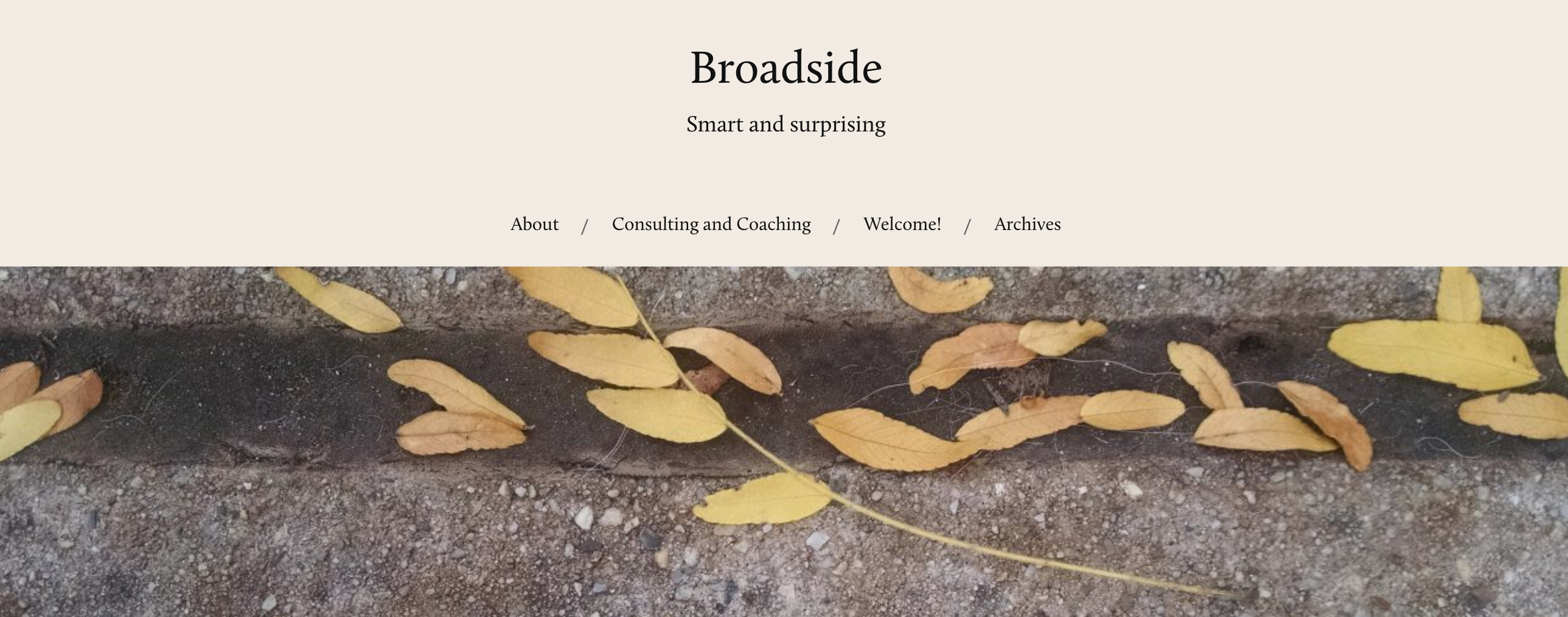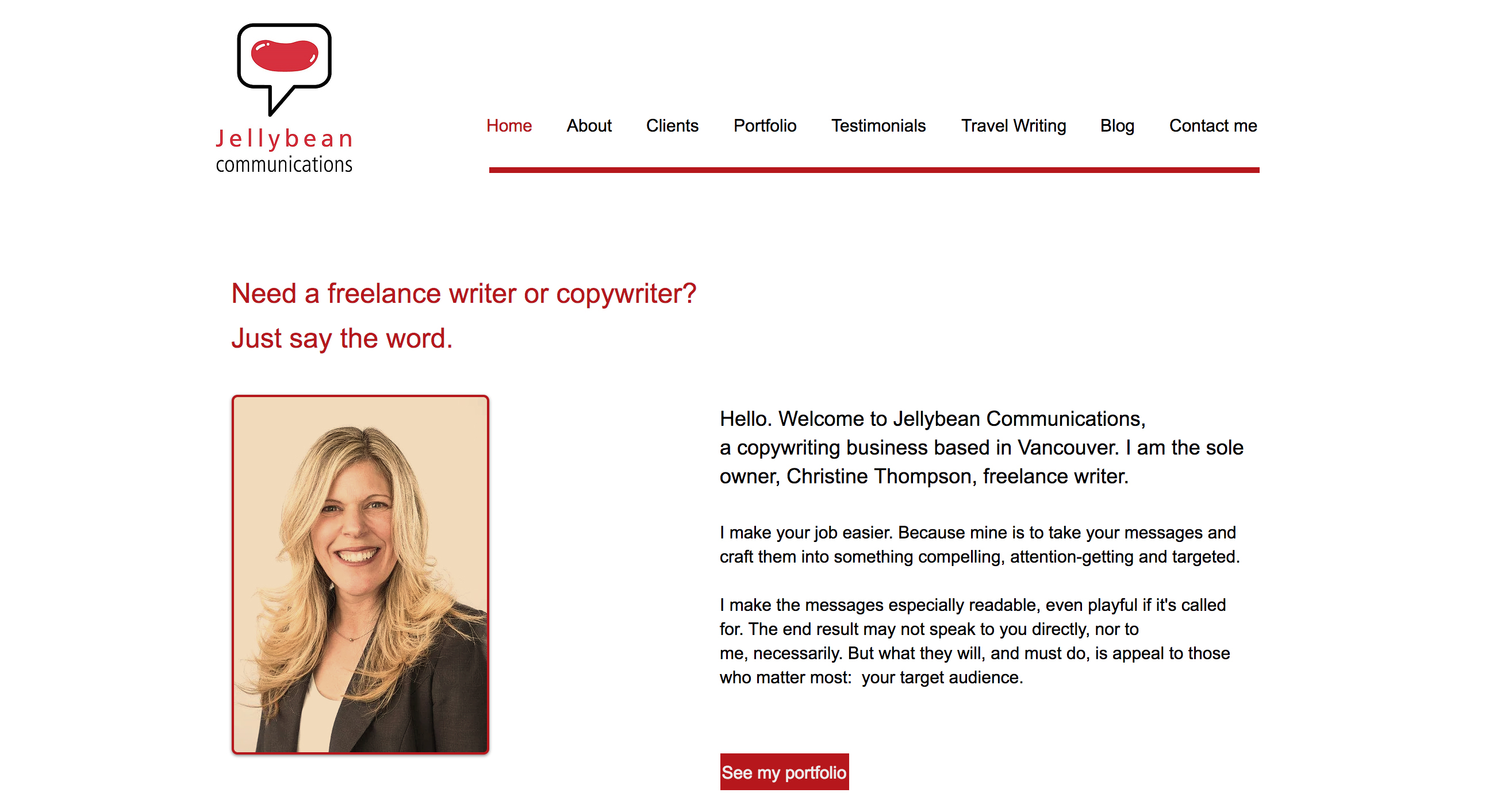Reaping what you sow: Five writers talk about their websites
by Steven Threndyle
For most of us, writing is a business. And if you’re a businessperson, you need some kind of online presence where, at the very minimum, you can post your published clips to prove to a prospective editor or client that you are, in fact, a professional.
In today’s post, we talk to five writers with very different looking websites or blogs. John Lee is a Vancouver-based travel writer who roams the world and tweets about it to his 12,500 followers.
NYC-based Caitlin Kelly’s Broadside blog features often-brilliant essays on travel, aging, finances, and the writing life.
Daphne Gray-Grant is a former Vancouver Sun editor who now coaches writers—both neophyte and experienced—from her Publication Coach website.
Christine Thompson is a White Rock, BC-based travel writer and corporate scribe who specializes in advertorial and sponsored content at Jellybean Communications.
And Eve Lazarus is a former Vancouver Sun reporter who shines a light on hidden, sometimes sordid, tales from Vancouver’s past on Every Place Tells A Story.
It’s worth noting from the outset that often writers will refer to stories as being “up on my blog” or “posted on my website.” Most writers have blogs, but not all writers have websites. As Daphne Gray-Grant says, “I do not use the terms interchangeably. The blog is the one section of my website that brings me the greatest number of readers.”

Though Blogger and Tumblr used to be popular, most writers now use Squarespace, WIX, Weebly, or WordPress. The latter is the 900 pound gorilla of blogging platforms, offering the ultimate in customization and flexibility. Over time, it has developed into a relatively user-friendly website platform with hundreds of different “plug-ins” to accommodate e-commerce, polls, contests, and other highly-interactive functions.
If you have to choose between one and the other, however, a blog is definitely the way to go. They’re much easier to make changes and updates to and are automatically mobile-friendly (the screen re-sizes to fit the size of your smartphone or tablet). If you’re blogging a lot on your website, Google will index new entries as “fresh content” and drive your page-rank higher; ideally to the coveted “first page” status on Google.
Indeed, the “how” of developing a website is, for most writers, the most daunting of tasks; perhaps one, like professional photography, best left outsourced to the pros. Caitlin Kelly paid $3,000 USD to a Seattle design firm, while Lee and Thompson have spent weeks learning the ins and outs of WIX.com. The takeaway here is that you might not like what you see. John Lee says, “I paid someone to develop my last site and I was never that happy with it – it was best to do it myself and get it exactly the way I wanted.”
Gray-Grant concurs, “My first webmaster was pulling out his hair at my inability to sign off. Building a new website (with WordPress or Squarespace) is so much easier than it used to be. You can always fix/change things later!”
All of the writers interviewed said that a primary goal of their site was to serve as an online portfolio of their published work and to reach out to businesses and organizations to gain more work. In order to survive, most freelancers can’t depend solely on newspaper and magazine stories.
Caitlin Kelly goes one step further. “My blog is proof that I can produce readable digital-only copy (with 19,000-plus followers) and that is a useful thing to have if you are over, say, 45, and people just assume you’re a legacy media dinosaur who can’t capture eyeballs and attention online.”
Beyond building a website, displaying your pages so that your stories and services are easy to find on Google means you need to learn SEO (search engine optimization) and SEM (search engine marketing) skills, since prospective clients aren’t likely coming to your site willy-nilly.
Christine Thompson says, “Recently, I updated my site and discovered WIX has a step-by-step guide built in now to optimize your site for Google and for SEO. I am no expert, but seem to have developed a website that comes up in the top page when clients search for a freelance writer.”
Thompson also posts regularly on LinkedIn, which is sometime an overlooked platform. She also advises watching any number of online videos (there are good resources for CMG members at Lynda.com, which members can access free of charge).
Eve Lazarus uses her website to create a kind of virtuous circle with readers who follow her blog or find her on Facebook and Twitter.
“My blog and Facebook page, which both operate under the title ‘Every Place has a Story,’ give people a reason to visit my website, and hopefully buy my books. I post fresh content once a week that mirrors the subjects of my books—local history, heritage houses and true crime. The reasoning is, if people are interested in my blog posts, they will go on and buy my books,” she says.
As a subject matter expert on Vancouver history, she’s also frequently interviewed by mainstream media outlets, though, she says, “I’m not sure this helps with my goals of selling books.”
Of all the writers interviewed, Daphne Gray-Grant is the only one who almost solely depends on her website and blog to generate income. As a writing coach, her position is somewhat unique amongst this group, but her advice certainly applies to everyone.
“When I first started, I put a lot of energy in doing guest posts for other websites. This worked at increasing traffic to my site. I hired an SEO expert about six years ago and he has helped build my website rankings (Google Analytics) enormously.
Mostly, though, Gray-Grant says, “I see myself as the very definition of a “long tail.” I build slowly and surely. I started blogging five times per week and calculate I’ve written more than 750,000 words of blog posts in the last decade.”
She advises being active on Twitter and other writers’ social media feeds in order to keep your name out there.
If all of this sounds daunting and businesslike, perhaps it’s best heed Caitlin Kelly’s approach. “I blog because I enjoy the dialogue with my readers (not just nasty comments you see on your published stories); it engages me; it’s global; and I can write whatever I please.”
Isn’t that why we all started writing in the first place?
Steven Threndyle is a Vancouver-based freelance writer. You can find him on Twitter at @threndyleski.







